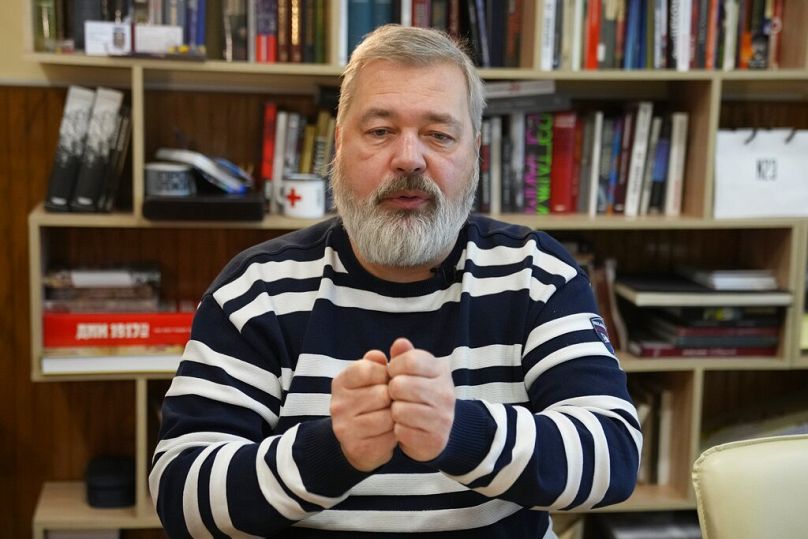The pair were given the award "for their efforts to safeguard freedom of expression".
Journalists Maria Ressa and Dmitry Muratov have been awarded this year's Nobel Peace Prize.
 ADVERTISEMENT
ADVERTISEMENT
 ADVERTISEMENT
ADVERTISEMENT
It was announced at a ceremony in Oslo on Friday morning.
The pair were given the award "for their efforts to safeguard freedom of expression, which is a precondition for democracy and lasting peace".
Ressa, from the Philippines, "focused critical attention on the Duterte regime’s controversial, murderous anti-drug campaign", said the Norwegian Nobel Committee.
Muratov, meanwhile, was one of the founders of the independent Russian newspaper Novaya Gazeta. The committee said it was "the most independent newspaper in Russia today, with a fundamentally critical attitude towards power".
"The award of the Nobel Peace Prize to Maria Ressa and Dmitry Muratov is intended to underscore the importance of protecting and defending these fundamental rights," the committee said.
Who are this year's prize winners?
Ressa co-founded in 2012 the news website Rappler.
The website's reporting and criticism of the murderous campaign led in 2020 to a guilty conviction of libel in a Manila court. The case has been criticised by human rights groups as a blow to press freedom in the Philippines.
Ressa has also been critical of tech companies' role in manipulating public debate and their failure to stop hate speech.
Russian journalist Muratov's newspaper Novaya Gazeta, meanwhile, is known for "its in-depth investigations on sensitive issues such as high-level corruption, human rights violations, and abuse of power," according to the Committee to Protect Journalists.
Muratov has been the editor of the paper for 24 years. During that time, six of the newspaper's journalists have been killed "including Anna Politkovskaja who wrote revealing articles on the war in Chechnya", the Nobel Prize committee said.
Muratov has won several awards including the International Press Freedom Award in 2007.
The story of the Nobel Peace Prize
The prize, which has been awarded 102 times since 1901, goes to a person or persons who has or have “done the most or the best work for fraternity between nations”.
In its history, the prize has gone to 25 organisations, 17 women and on two occasions been divided between three people. Only one recipient, Vietnamese statesman Le Duc Tho, has declined the accolade, which he shared with Henry Kissinger.
Last year's prize went to the World Food Programme, which was established in 1961 at the behest of US President Dwight Eisenhower to fight hunger around the globe. The Rome-based UN agency was lauded for seeking to end starvation as “a weapon of war and conflict.”
The prestigious award is accompanied by a gold medal and 10 million Swedish kronor, which comes from a bequest left by the prize’s creator, Swedish inventor Alfred Nobel, who died in 1895.
This week's other winners
On Monday, the Nobel Committee awarded the prize in physiology or medicine to Americans David Julius and Ardem Patapoutian for their discoveries into how the human body perceives temperature and touch.
The Nobel Prize in physics was awarded Tuesday to three scientists whose work found order in seeming disorder, helping to explain and predict complex forces of nature, including expanding our understanding of climate change.
Benjamin List and David W.C. MacMillan were named as laureates of the Nobel Prize for chemistry Wednesday for finding an easier and environmentally cleaner way to build molecules that can be used to make compounds, including medicines and pesticides.
The Nobel Prize for literature was awarded Friday to U.K.-based Tanzanian writer Abdulrazak Gurnah, who was recognised for his “uncompromising and compassionate penetration of the effects of colonialism and the fate of the refugee."











